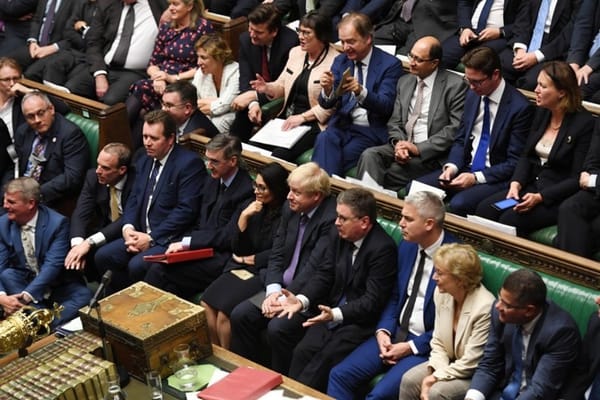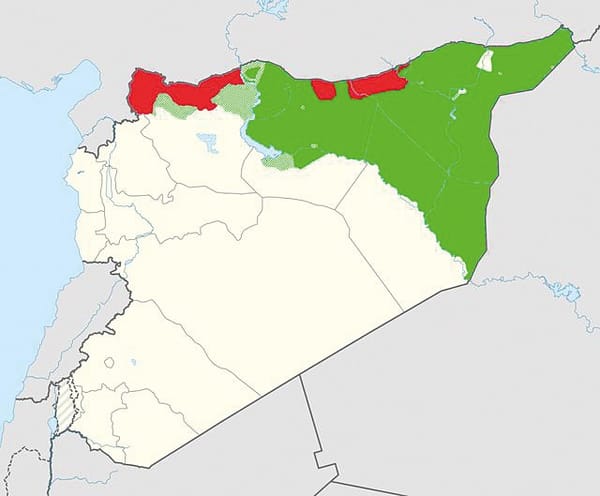General Election Time
A general election has been called for December 12th, eligible voters should ensure they are registed to vote

Above: General Election 2017 constituency map
It would be impossible to discuss any politics in the UK without stumbling upon Brexit. Brexit has been the key political issue of the last three years, a problem that successive governments have been unable to satisfactorily resolve.
The calling of this election is directly linked to the Brexit process and will have a significant impact on the outcome.
Boris Johnson’s government was formed as a result of the leadership election following the resignation of Theresa May. Theresa May’s government was only possible as a result of a confidence and supply deal (a promise to vote with the Tories) with the Democratic Unionist Party, a unionist party of Northern Ireland, providing only a very slim majority in Parliament.
Following Boris Johnson’s controversial stance that a No-Deal Brexit must be an option for the UK- EU negotiations, Johnson attempted to trigger an early election twice but failed to win the vote both times. In the past, a British Prime Minister was able to dissolve Parliament at will, effectively calling a General Election. However, the Fixed Term Parliament Act of 2010 changed this. Negotiated as a condition of the 2010 Tory-Liberal Democrat coalition, this act was intended to prevent either side from being able to bring down the government by imposing a requirement for a two-thirds vote in the House of Commons in order to call a General Election.
Despite this, in the ongoing negotiations with the EU Johnson continued to press for the No-Deal option but was defeated in a series of key votes, preventing the No-Deal scenario. These votes were partially lost as a result of 21 Conservative MPs rebelling against Johnson’s government and subsequently being kicked out of the party. Some of those MPs have now been readmitted.
A Brexit deal between the EU and the UK has now been agreed, which allays the concerns of many with regards to a No-Deal Brexit. That threat having subsided, the parties that were previously opposed to the prospect of a new election have approved a UK general election for the 12th of December. However, the approved ‘deal’ is only a political declaration of what a future trading relationship would look like, rather than an actual binding contract which will take many more months to hash out.
Each of the political parties, Conservatives, Labour, Liberal Democrats, Greens, Brexit Party and others are lining up for an election that will determine who will lead the country over the next five years and impose new fiscal and social policies on the UK. Furthermore, Brexit will remain a key issue with the potential for renegotiation, or a second referendum dependending on the outcome of the election.
The result of this upcoming election will, of course, determine more than just the outcome of Brexit. It will decide if you need a visa to spend a year of your course in the EU; it will determine things as varied as income tax and foreign policy to if you can access healthcare on the same basis as local EU citizens; if you will have to pay roaming charges for using your phone in the EU; if your tuition fees change or if they’ll be abolished; if recreational cannabis becomes legal; if you need a visa to remain in the UK... the list goes on. No matter who you are and which side of the argument you are on, this election will make a difference to you and your future.
The political parties and what they have to gain/lose with this election:
Conservative
The Conservatives are hoping for a strong election victory that removes their dependence on the DUP and provides them with a sufficient majority to enact their economically liberal fiscal policies as well as achieving their hard-line stance on the EU-UK deal. Reduced regulation and taxes, as well as potentially reopening the negotiations with the EU with the strong possibility of a No Deal. This election may also be crucial for the direction of the Conservative party as a whole, with a significant victory moving it to the right, while a loss could lead to a revolt by the more moderate MPs.
Labour
Labour are also aiming for a strong election victory, that would allow them to enact their socialist fiscal policies. After nine years in opposition and a leadership change, the Labour party is almost unrecognisable from the last time it was in power. They will renationalise significant parts of the UK economy as well as increasing taxes for some sections of society, Labour are also aiming to allow a second referendum on Brexit. The Labour party is also vulnerable to a change in direction, with a loss possibly resulting in the removal of the divisive figure of Jeremy Corbyn.
Liberal Democrats
The Liberal Democrats are hoping to win “Hundreds of seats,” by decisively capturing the remain vote. This remains a key element of their policy, with the goal of cancelling Brexit entirely through a second referendum.
Greens
The Greens are aiming to capitalise on the Green Wave sweeping the world. Increased awareness of the environmental movement may help the Greens to gain a couple more votes and enact their programme of environmentally and socially conscious reforms.
Brexit Party
The Brexit party are aiming for exactly that- Brexit at all costs. They could be said to match or exceed the Conservative party’s aims when it comes to socially and economically conservative reforms.
Scottish National Party
The SNP are aiming for a strong election result North of the border in order to provide impetus for a second Independence Referendum. This is likely to hinge on the likelihood of a No-Deal Brexit and the probability of an unpopular Conservative government in London.
Other parties
Other smaller parties will of course also be fighting for seats across the country. While their agendas might not feature as highly in the media, they will be hoping that any seats that they win will give them a say in the Brexit negotiating table.







